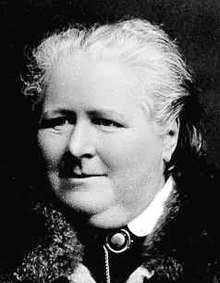Frances Power Cobbe
Appearance

Frances Power Cobbe (4 December 1822 – 5 April 1904) was an Irish writer, social reformer, anti-vivisection activist, and leading women's suffrage campaigner. She founded a number of animal advocacy groups, including the National Anti-Vivisection Society (NAVS) in 1875, and the British Union for the Abolition of Vivisection (BUAV) in 1898.
Quotes
[edit]
- The time comes to every dog when it ceases to care for people merely for biscuits or bones, or even for caresses, and walks out of doors. When a dog really loves, it prefers the person who gives it nothing, and perhaps is too ill ever to take it out for exercise, to all the liberal cooks and active dog-boys in the world.
- The Confessions of a Lost Dog (London: Griffith & Farran, 1867), pp. 15-16.
- I could discern clearly, even at that early age, the essential difference between people who are kind to dogs and people who really love them.
- The Confessions of a Lost Dog (London: Griffith & Farran, 1867), p. 19.
- We can benefit our kind in no way so much as by being ourselves pure and upright and noble-minded.
- The Scientific Spirit of the Age (Boston: Geo. H. Ellis, 1888), Ch. II: "The Education of the Emotions", p. 66
- I could not bear it did I not believe in another life for the poor harmless victims where their wrongs will be recompensed, & I may add also in another life for their inhuman persecutors where they will all repent in moral agony worse than the physical pain of their poor victims.
- On vivisection. Quoted in Sally Mitchell, Frances Power Cobbe: Victorian Feminist, Journalist, Reformer (Charlottesville and London: University of Virginia Press, 2004), p. 348.
The Duties of Women (1881)
[edit]- The Duties of Women: A Course of Lectures, New York: Cambridge University Press, 2010
- We women have before us the noblest end to which a finite creature may attain; and our duty is nothing else than the fulfilment of the whole moral law, the attainment of every human virtue.
- Lecture I, p. 23
- He who does most to cure woman of her weakness, her frivolity and her servility, will likewise at the same stroke do most to cure man of his brutality, his selfishness and his sensuality.
- Lecture I, p. 36
- Love naturally reverses the idea of obedience, and causes the struggle between any two people who truly love each other to be not who shall command, but, who shall yield.
- Lecture IV, p. 107
- The making of a true Home is really our peculiar and inalienable right; a right which no man can take from us, for a man can no more make a Home than a drone can make a hive. He can build a castle or a palace, but, poor creature! be he wise as Solomon and rich as Croesus, he cannot turn into a Home. No masculine mortal can do that. It is a woman, and only a woman; a woman all by herself if she likes, and without any man to help her, who can turn a House into a Home.
- Lecture IV, pp. 114-115
- My great panacea for making Society at once better and more enjoyable would be to cultivate greater sincerity.
- Lecture V, p. 136
- I think that every woman who has any margin of time or money to spare should adopt some one public interest, some philanthropic undertaking, or some social agitation of reform, and give to that cause whatever time and work she may be able to afford; thus completing her life by adding to her private duties the noble effort to advance God's Kingdom beyond the bounds of her home.
- Lecture VI, p. 158
The Modern Rack (1889)
[edit]- The Modern Rack: Papers on Vivisection, London: Swan Sonnenschein, 1889
- As the main work of civilisation has been the vindication of the rights of the weak, it is not too much, I think, to insist that the practice of Vivisection in which this tyranny of strength culminates is a retrograde step in the progress of our race—a backwater in the onward flowing stream of justice and mercy, no less portentous than deplorable.
- Ch. I: The Moral Aspects of Vivisection, p. 15
- By some strange and sinister fatality the chosen victims at present are the most intelligent and friendly of our domestic favourites—the cats who purr in love and confidence as they sit beside us on the hearth; the dogs whose faithful hearts glow with an affection for us, truer and fonder than we may easily find in any human breast.
- Ch. I: The Moral Aspects of Vivisection, p. 15
- Every system of law is a system of education, and, in extending legal sanction to the scientific torture of animals, the State educates the nation in a false view of the relations of man to the lower creatures, encourages selfishness and cruelty and the disregard of the rights of the weak by the strong.
- Ch. XV: Four Reasons for Total Prohibition of Vivisection, pp. 223-224
Quotes about Frances Cobbe
[edit]- As our President said, we have in our army such minds as Spencer, and Mill, and I would add Buckle, and many others; and they are diffusing light, intelligence and civilization, and advocating the right. We have women also. We have Frances Cobbe; whose name I speak with pride and rejoicing; and in the literary world we have Charlotte Bronte, and Harriet Beecher Stowe, and many others, who are consecrating their talents to the great cause of womanhood, and freedom, and right.
- Lucretia Mott, "The Mind and Powers of Woman" (May 10, 1860)

